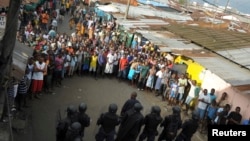The Liberian capital swirled with fear and confusion Thursday, as a nationwide nighttime curfew to slow the spread of Ebola went into full effect and a slum neighborhood was violently quarantined off from the rest of city.
With Liberia reporting the most new cases of the deadly virus, the quarantine — an extreme measure rarely seen in public health emergencies anywhere — of the impoverished neighborhood of West Point appeared to be a sign of increasing desperation by the government.
President Ellen Johnson Sirleaf declared a national 9 p.m.-to-6 a.m. curfew on Tuesday, as well as West Point’s cordoning off. The timing of the announcement came as a surprise to many Liberians, as well as West Point residents, who clashed with soldiers after barricades made of tables, chairs and barbed wire went up early Wednesday.
“There is reason to be frightened. Everyone should be frightened,” said 52-year-old Emmanuel Davis, a businessman in Monrovia, who spoke to VOA by telephone. “People are past the stage of denial, they are in the stage of fear.”
The World Health Organization said nearly 2,500 people have been infected by the virus in four West African countries, with more than 1,350 people dying from it. Many experts have cautioned that those figures likely undercount the death toll, however.
Guinea, Sierra Leone and Nigeria have reported cases, though Liberia is worst hit, reporting 90 percent of new deaths.
Some rural parts of Liberia, Guinea and Sierra Leone have been subjected to severe travel restrictions, with soldiers manning checkpoints and taking people’s temperatures to check for symptoms of the virus, which is extremely infectious and fatal.
Local and foreign news reports said the price of basic goods in some parts of Monrovia, particularly in West Point, had climbed sharply Wednesday and Thursday.
By Thursday afternoon, however, government officials had arrived with bags of rice, drinking water packets and cooking oil, with hundreds of residents lining up at the distribution point, The Associated Press reported.
Misinformation and Distrust
There was also a growing sense that the effort to halt the disease’s spread was being hampered by misinformation, and persistent distrust toward the government, a fact that Sirleaf alluded to earlier this month in declaring a state of emergency.
"Ignorance and poverty, as well as entrenched religious and cultural practices, continue to exacerbate the spread of the disease,” Sirleaf said.
In West Point, a bustling, peninsular shantytown housing tens hundreds of thousands of people, the government last week had turned an elementary school building into an Ebola ward. But tensions soared after a group of young men armed with clubs rampaged through the center, yelling "there's no Ebola" in Liberia, witnesses reported.
On Wednesday, soldiers erected barricades of barbed wire, wood and furniture to seal off the neighborhood. News reports quoted residents as saying they had no advance notice of the quarantine, and were prevented from getting to work or buying food. At least four people when police fired bullets and tear gas to disperse the stone-throwing protesters.
“I’m telling you live bullets were used. A 15-year-old boy by the name of Sylvester Kromah was shot in the leg by the Liberian army,” Vandalark Patricks, national director of Liberia Campaigners for Change, told VOA. “When he went to rescue one of his family members, who also received a bullet in the process, his leg was shot by … soldiers.”
Defense Ministry Denies Fatal Shooting
Defense Minister Brownie Samukai however denied that, and said soldiers were attacked.
“A group of unruly residents came and began to attack the police and military personnel, throwing rocks, sticks, anything they could put their hands on. And, they went to attack the residence of the district commissioner. It was within the context of that that shots were fired in the air, I repeat, in the air, to disperse the crowds,” he told VOA.
“We have to find the way to cut the spread of the virus. And, the way to cut the spread of the virus is to make sure that we are positioned in a way to identify those who have the sickness and, at the same [time], identify those who need assistance,” Samukai said.
West Point residents were also angered that soldiers sought to free the district’s head commissioner, who had been held hostage by people upset by the quarantine, Patricks said.
“The commissioner, being a resident of that community, decided to leave with the help of some higher ups to go to another area. So, the residents said you cannot leave us here because the law does not exclude anyone,” he said.
Ebola’s rapid spread through Liberia has been fueled not only distrust of government messages, but also mistaken beliefs that folk remedies could stop or cure the disease, said Alfred Goumorlor, who runs a non-government organization in Monrovia called Critical Thinking Liberia.
“Many people said the government was lying, the government was trying to make money and because of that, the government wasn’t able to take immediate action to quarantine local communities,” he said.
South Africa Announces Travel Ban
Some other African countries have also begun imposing travel bans to the three afflicted West African nations; South Africa on Thursday became the latest to impose such a restriction. With some airlines canceling flights to the countries, fears are also growing that disappearance of badly needed tourists will weaken the countries’ fragile economies.
Guinea has started deploying civilian and military medical officers to its borders with Sierra Leone and Liberia as part of efforts to contain the virus.
According to WHO, fruit bats are the likeliest host for the virus. In the current outbreak, the majority of human cases have occurred as a result of human-to-human transmission from contact with blood, urine or saliva or contact with contaminated bed linens or clothing.













